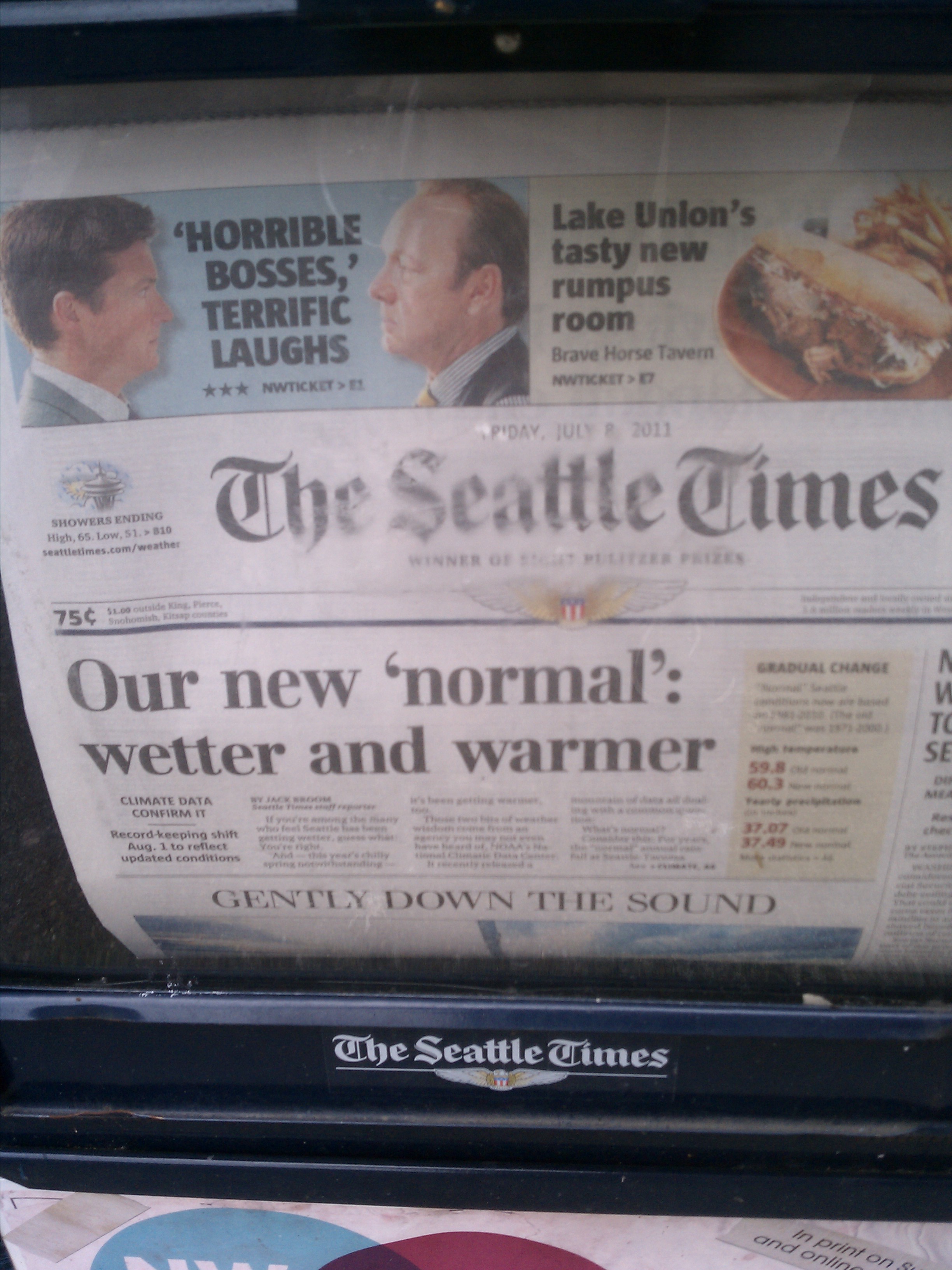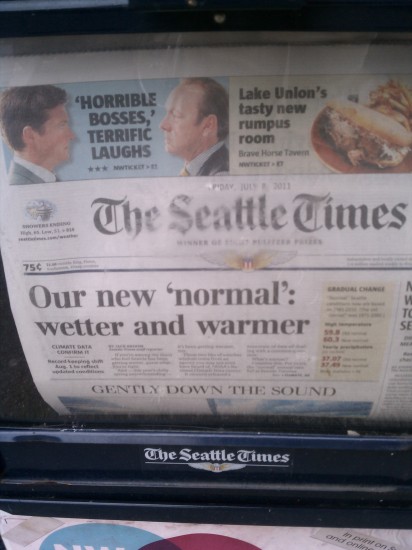Today’s Seattle Times’ headline seemed to say it all: Our new ‘normal’ weather: wetter and warmer. At last, I thought, a front page story on the very real impacts of climate change in our region.
Things start off great. The article acknowledges scientific certainty that average temperatures in Washington have risen half a degree. Yes, it acknowledges that the United States has seen a 1.5 degree increase over the last thirty years. Yes, it says: if you’re among the people who feels like Seattle is getting warmer, you’re right. Things are getting wetter and weirder.
But the reporting deteriorates when the climate-connection comes up. Here’s what comes at the very end of the article:
There’s no simple explanation for the overall changes in Seattle or nationally — or even a consensus as to whether they’re a big deal, given the often polarizing debate surrounding global climate change.
Some scientists say the data provide further evidence that greenhouse gases are building up in the atmosphere, heating the planet.
But Tim Ball, chairman of the Natural Resources Stewardship Project, which is skeptical of global warming, told the Los Angeles Times he considers the half-degree rise in the normal U.S. temperature “essentially insignificant.”
Really? Why is the Times emphasizing the tired, old, political debate on climate change rather than giving readers the straight story about scientific consensus? Why do they give the quote—or any ink at all for that matter to a climate-science denier? (When over 97 percent of climate scientists agree on climate change, why only give voice to the negligible minority?).
Here’s the thing: It’s not just about the Seattle Times missing a chance—and responsibility—to get the story right. Downplaying the local reality of climate change, and ignoring the warnings of our scientific community is a public disservice. Because the “new normal” isn’t normal at all.
Update 7/11: Here we go again; another gimmick from the Washington Policy Center. This time, they’ve challenged us to find a climate scientist to back up words I didn’t say:
[W]e challenge Sightline to find one climate scientist at the UW Department of Atmospheric Sciences who says recent weather patterns (unusually hot in 2009 or unusually cold in 2011), are the result of anthropogenic climate change.
But in my post last Friday I never claimed that the weather in 2009 or 2011 was caused by climate change. I also never said, contrary to Myer’s assertion, that “it is the ‘responsibility’ of the Times to link the current weather to climate change.” What I did say, is that the Times has a responsibility “to get the story right.” My post is a media critique, not a scientific one: I argue that the Times article does a very poor job of explaining the state of climate science.
That said, Myer’s misreading of my post makes me realize that I could have been a little clearer. My kicker would have been better if written as “Seattle Times shows Washington is warming, but errs in explaining climate change.” Furthermore this sentence, “Downplaying the local reality of climate change, and ignoring the warnings of our scientific community is a public disservice” implies certainty about the climate science behind current local impacts when there is some uncertainty. (What is certain, however, is the global trend in warming that we’re already seeing.) That sentence could have been more clearly written: “Omitting an accurate discussion of climate change when talking about long-term weather trends and ignoring the warnings of our scientific community is a public disservice.”
Again, the point of my post—which Myers seems to have overlooked—is that when writing about long-term weather trends, it’s irresponsible to bring up climate change (which the Times did), but fall back on the tired, old trope about a “debate” over climate science. The debate is over. The vast, vast, vast majority of climate scientists agree that global warming is happening. To frame the story in a way that implies the scientific verdict is still out—and then give the last word (and only quote) to the lone climate-science denier—isn’t responsible reporting.











Erin Greeson
Excellent piece. It is critical to hold the media accountable when it comes to disseminating best available science in an accurate, appropriately balanced way. The urgent issue of climate change needs action and a significant shift in consumer behavior, not futile outdated debates, such as the one this recent article perpetuates. Thank you for speaking out!
Joan Lieberman-Brill
Why isn’t the position quoted that is supported by somewhere around 98% of the scientist’s around the world rather than that representing the extremely unsupported viewpoint that does not attribute these weather trends to climate change? Does the Seattle Times have a political agenda that it isn’t disclosing? Why isn’t it presenting the SCIENTIFICALLY supported viewpoint more clearly? And why isn’t the Times highlighting the fact that the vast majority consider the link unequivocally?
Robert McClure
Note that the reporter who wrote this story does not specialize in environmental coverage. Most of us who do specialize in environment long ago figured out that “balance” in this story — that is, bringing up the microscopic minority of scientists who publish on climate change in peer-reviewed journals and yet count themselves as “skeptics” — is really false balance and disservice to our readers. However, this story will increasingly be told not by environmental reporters, but by generalists such as the fellow who wrote this story.
It should be noted further, though, that while most climate scientists agree on the basics of greenhouse gasses having already started to affect the climate, there remains a vast array of disagreement among them about the likely pace and severity of climate change. In my lifetime, the leading climate scientists went from thinking this was a problem for our children’s generation to realizing it’s our problem right now. It appears to be coming on much faster and stronger than climatologists would have predicted even 10 years ago. Here’s a story I did with Lisa Stiffler at the Seattle Post-Intelligencer in 2003 cataloguing many of the ways climate change already is affecting the Pacific Northwest: http://bit.ly/qsWJKB Here’s a story a science and environment specialist at the Times did two years later saying that, hey, guess what — climate change is for real: http://bit.ly/cdnofI
Rick
The Times did the right thing and should be applauded for it. Newspapers are supposed to report topical events and stay away from opinions, or at least those conclusions they don’t know about. Is the local climate getting warmer? Clearly, yes. Is the increase warming due to man-made events and we should alter our policies to counter their effects? Ask the experts. Maybe the Times could have contacted people on both sides of this information to ask for their thoughts, but that wouldn’t be news. Everybody knows who has what opinion.
I think what angers most of the activist climate change community on the Times behavior is that they didn’t try to make a geopolitical point when the opportunity arose. We are so used to having news come out with a left or right bent to the story, it is easy to fail to notice when just the straight facts are presented. What a breath of fresh air!
Gabriel B. Atega
The climate change debate is endless if it is focused solely on the effect of emissions or primarily upon the level of CO2 in the atmosphere. The scientific basis for the CO2 argument is thin.
However, if we accept as fact that during the 1800’s Europe and the United States lost 80% of their forests when these were converted to wood fuel for steam engines used in trains and boats and for steel production (when coal was not yet extensively used until after 1870); when forest lands were converted into farm lands; when more trees were cut to build homes and furniture; and then when the rest of the world followed by losing similarly 80% of the forests beginning in the 1900’s as exports of lumber, plywood and other wood products for export to the developed countries like Japan, USA, and Europe (because they have decided to keep the remaining 20% of their forests untouched), then this is the argument that should tell us that we not only have changed the climate but also the very nature and character of our planet habitat.
What is the total effect of losing the forests?
We lost a big part of the CO2 absorbing capacity of the planet. We lost the green carpet that softened the movements of the winds. We lost the big fresh water holding capacity of the planet, and converted the fresh waters held by the forests into more water vapor in the atmosphere that brings as a result heavy floods and snowfall following superstorms. We lost a large chunk of the oxygen production capacity of the planet that use to counterbalance the heat retention character of water vapor plus the little help of another heat retaining element CO2, because oxygen is a cold element. We lost the air cleaning function of the forests that by its leaves, the dust particles and pollutants in the atmosphere are reduced, consequently reducing the frequency of precipitation and occurrence of asthma. We lost the mist like irrigation system that gently poured water to farm lands by early morning dew and fog. We lost the diversity of life and habitat on the land.
When we take all of these into consideration, indeed we have caused the harsh climate that we are now having. We have change gentle climate to harsh climate not because we have emitted CO2, but because we have cut down the forests of the world, without a feeling of guilt, and still we are unrepentant, and we have not accepted that we have done so. In fact , we still continue to cut down the forests and argue that doing so is very good to the economy.
The real issue is not climate change per se, because the climate is constantly changing. The issue really is about having harsh climate instead of the gentle climate experienced by Ferdinand Magellan, who upon crossing the biggest ocean for over a year declared that it was Pacific.
Regularly recurring harsh climate started in the 1800’s following the extremely massive cutting down of the forests fo the whole planet. Dust storms, super typhoons and hurricanes, heavy snowfall, large hail stones, devastating floods, destructive tornadoes, severe and contrasting weather of drought and floods, extremely hot summers and very cold winters, increasing earthquakes following shifts in surface weights due to movements of ice and water over the oceans, all these will continue to become more severe for as long as we keep the planet’s land surface bald without its hair of forests.
RW
I get so tired of this drivel – “climate is constantly changing.” My friend, a softball lobbed at you in a gentle arc and a bullet fired at you by a high powered rifle are both “objects in motion.” Do you want to consider them the same? The point is that we are changing the climate at a rate that far exceeds the capability of biological systems to adapt, and, unfortunately, also seems to far exceed our cultural capability to adapt (especially when change is opposed by well-funded interests that can fundamentally affect the political and media discourse).
Yes, we have fewer forests, and that’s a big problem. But even with more forests, there’s no way to absorb the volume of climate changing gases such as CO2 and methane that are being released. And despite your factoid on CO2, there is no real argument among experts on this issue. But the interests I spoke about above keep pushing the idea everywhere they can and folks like you keep brainlessly repeating it.
Dr. Sutton
Here’s an interesting post about this article
http://cliffmass.blogspot.com/2011/07/northwest-getting-warmer-and-wetter.html
Eric Hess
Yes, local and regional ties to climate change are hard to pin down thus far. My bigger point with this post was the flawed treatment of climate change at the end—rehashing the settled debate and giving ink to the climate science denier.
Dave
Global Warming or the newer more politically correct name “Climate Change” will go down in history as one of the biggest hoaxes ever. We do not control this planet, We are nothing but ants on the anthill. Mother Nature does what Mother Nature wants and that’s that. The only purpose of this charade is to generate revenue for certain groups and power grabs by Governments.
Dave
Here is another example of the scam science behind “Global Climate Change”:
http://news.yahoo.com/apnewsbreak-arctic-scientist-under-investigation-082217993.html
Dave
Another Great Example:
http://news.yahoo.com/nasa-data-blow-gaping-hold-global-warming-alarmism-192334971.html
Any comments Eric….
Barry
I’ll give you a comment, Dave. The second article you posted was written by a representative of the Heartland Institute for Forbes. The same Heartland Institute that advocates for ‘smoker’s rights’ against tobacco regulation, the same Heartland Institute that gets funding from ExxonMobil to create false climate denial think tanks and ‘petitions,’ including the largely discredited Oregon Petition.
Perhaps you’d like to mention the bullshit ‘Climate Gate’ emails? the fake controversy that has since been cleared by several independent investigations, including two distinct universities, the NSF, the Dept of Commerce Inspector General, the EPA, and the UK House of Commons.
You’re certainly right that “The only purpose of this charade is to generate revenue for certain groups,” but if you want to follow the money trail, then follow the billions that private corporations stand to gain by denying climate change instead of the thousands and millions in grants scientists can earn by ‘faking’ science.
And don’t be ignorant.
Carol Johnson
How about wetter and colder!
Carol Johnson
How about colder and wetter!